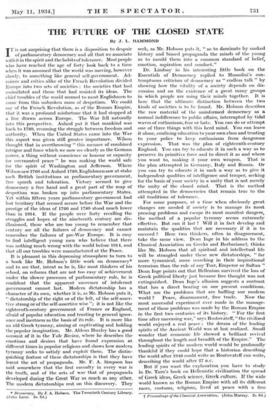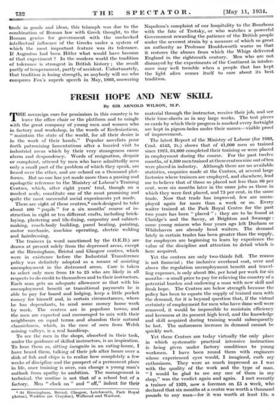THE FUTURE OF THE CLOSED STATE By J. L. HAMMOND
IT is not surprising that there is a disposition to despair of parliamentary democracy and all that we associate with it in the spirit and the habits of tolerance. Most people who have reached the age of forty look back to a time when it was assumed that the world was moving, however slowly, to something like general self-government. Ad- mirers and critics alike of the French Revolution divided Europe into two sets of societies : the societies that had assimilated and those that had resisted- its ideas. The chief troubles of the world seemed to most Englishmen to come from this unbroken mass of despotism. We could say of the French Revolution, as of the Roman Empire, that it was a profound misfortune that it had stopped at a line drawn across Europe. The War fell naturally into this perspective. Aulard put it that mankind was hack to 1789, resuming the struggle between freedom and authority. When the United States came into the War this aspect was given still greater iMportance. Wilson thought that in overthrowing " this menace of combined intrigue and force which we now see clearly as the German power, a thing without conscience or honour or capacity for covenanted peace " he was making the world safe for the spirit of Washington and Jefferson. Where Wilson saw 1766 and Aulard 1789, Englishmen saw at stake such British institutions as parliamentary government, free speech and toleration. Victory seemed to give democracy a free hand and a great part of the map of despotism was broken up into parliamentary States. Yet within fifteen years parliamentary government had lost territory that seemed secure before the War and the prestige of the ideas of 1766 and 1789 stood much lower than in 1914. If the people over forty recalling the struggles and hopes of the nineteenth century are dis- illusioned, those who are too young to remember that century see all the failures of democracy and cannot remember the failures of pre-War Europe. It is easy to find 'intelligent young men who believe that there was nothing much wrong with the world before 1914, and that all our troubles were manufactured at the Peace.
It is 'pleasant in this 'depressing atmosphere to turn to a book like Mr. Hobson's little work on democracy* and to see that, intent as he is, like most thinkers of his school, on reforms that are not too easy of achievement under the 'slower processes of parliamentary rule, he is confident that the apparent successes of intolerant government cannot last. Modern dictatorship has a character of its own; whether it is, as Mr. Hobson puts it, " dictatorship of the right or of the left, of the self-asser- tive strong or of the self-assertiVe wise "; it is not like the eighteenth-century government of France or England, afraid of popular education and trusting to general ignor- ance and inertness.as the basis Of its rule. It is more like an old Greek tyranny, aiming at captivating and holding the popular imagination. Mr. Aldous Huxley kas a good account Of it in the Yale-Recital, where he describes the emotions and desires that have found expression at different times in popular religions and shows how modern tyranny seeks to satisfy and exploit' them. The distin- guishing feature of these dictatorships is that they have learnt the - art of propaganda. Mr. F. A. Simpson has said somewhere that the first casualty in every war is the truth; and of the arts of war that of propaganda developed during the Great War as much as any other. The modern dictatorships rest on this discovery. They * Democracy. By S. A. Hobson. The Twentieth Century Library. (John Lane. 2s. 6d.) seek, as Mr. Hobson puts it, " so to dominate by cooked history and biased propaganda the minds of the young as to mould them into a common standard of belief, emotion, aspiration and conduct."
Dr. Lindsay in his interesting little book on the Essentials of Democracy replied to Mussolini's con- temptuous criticism of democracy as " endless talk " by showing how the vitality of a society depends on dis- cussion and on the existence of a great many groups in which people are using their minds together. It is here that the ultimate distinction between the two kinds of societies is to be found. Mr. Hobson describes the raw material of the uninformed democracy as a normal indifference to public affairs, interrupted by tidal waves of enthusiasm, fear or hate. You can do or attempt one of three things with this herd mind. You can leave it alone, confining education to your own class and trusting to your police to keep enthusiasm from dangerous expression. That was the plan of eighteenth-century England. You can try to educate &in such a way as to preserve its primitive force and to direct it as and where you want to, making it your own weapon. That is the plan attempted in Germany, Italy and Russia. Or you can try to educate it in such a way as to give it independent qualities of intelligence and temper, seeking for the basis of your society in a unity that is not merely the unity of the closed mind. That is the method attempted in the democracies that remain true to the old traditions of tolerance.
For some purposes, at a time when obviously great changes are needed if society is to manage its most pressing problems and escape its most manifest dangers, the method of a popular tyranny seems extremely effective. But can it last ? Will it in fact develop and maintain the qualities that are necessary if it is to succeed ? Here two thinkers, often in disagreement, take the same view. Dean Inge in his address to the Classical Association on Greeks and Barbarianst thinks like Mr. Hobson that all spiritual and intellectual life will be strangled under these new dictatorships, " far more tyrannical, more searching in their inquisitional terrorism than the rule of any Tsar, Emperor or Sultan " Dean Inge points out that Hellenism survived the loss of Greek political liberty just because free thought was not extinguished. Dean Inge's allusion suggests a contrast that has a direct bearing on our present conditions. What are the problems that are baffling our modern world ? Peace, disarmament, free trade. Now the most successful experiment ever made in the manage- ment of those problems was made by the Roman Empire in the first two centuries of its history. " For the first time after unceasing war," says Rostovzteff, " the civilized world enjoyed a• real peace ; the dream of the leading spirits of the Ancient World was at last realized. Small wonder that economic life showed a brilliant revival throughout the length and breadth of the Empire." The leading spirits of the modern world would be profoundly thankful if they could hope that a historian describing the world after 1940 could write as Rortovzteff can write, describing the world after 27 B.C.
But if you want the explanation you have to study in Dr. Tam's book on Hellenistic civilization the spread of Greek ideas, Greek science, Greek culture. If the wide world known as the Roman Empire with all its different races, customs, religions, lived at peace with a free t Proceedings of the Classical Association. (John Murray. 2s. 6d.) trade in goods and ideas, this triumph was due to the combination of Roman law with Greek thought, to the Roman genius for government with the unchecked intellectual influence of the Greeks under a system of which the most important feature was its tolerance. If Augustus had been Hitler what would have become of that experiment ? In the modern world the tradition of tolerance is strongest in British history ; the result partly of temperament, partly of accident. Unfortunately, that tradition is losing strength, as anybody will see who compares Fox's superb speech in May, 1803, answering Napoleon's complaint of our hospitality to the Bourbons with the fate of Trotsky, or who watches a powerful Government rewarding the patience of the British people under the severest strain by a measure of which so great an authority as Professor Houldsworth warns us that it restores the abuses from which the Whigs delivered England in the eighteenth century. Men who are not dismayed by the experiments of the Continent in intoler- ance may well tremble when a people that has kept the light alive ceases itself to care about its best tradition.









































 Previous page
Previous page